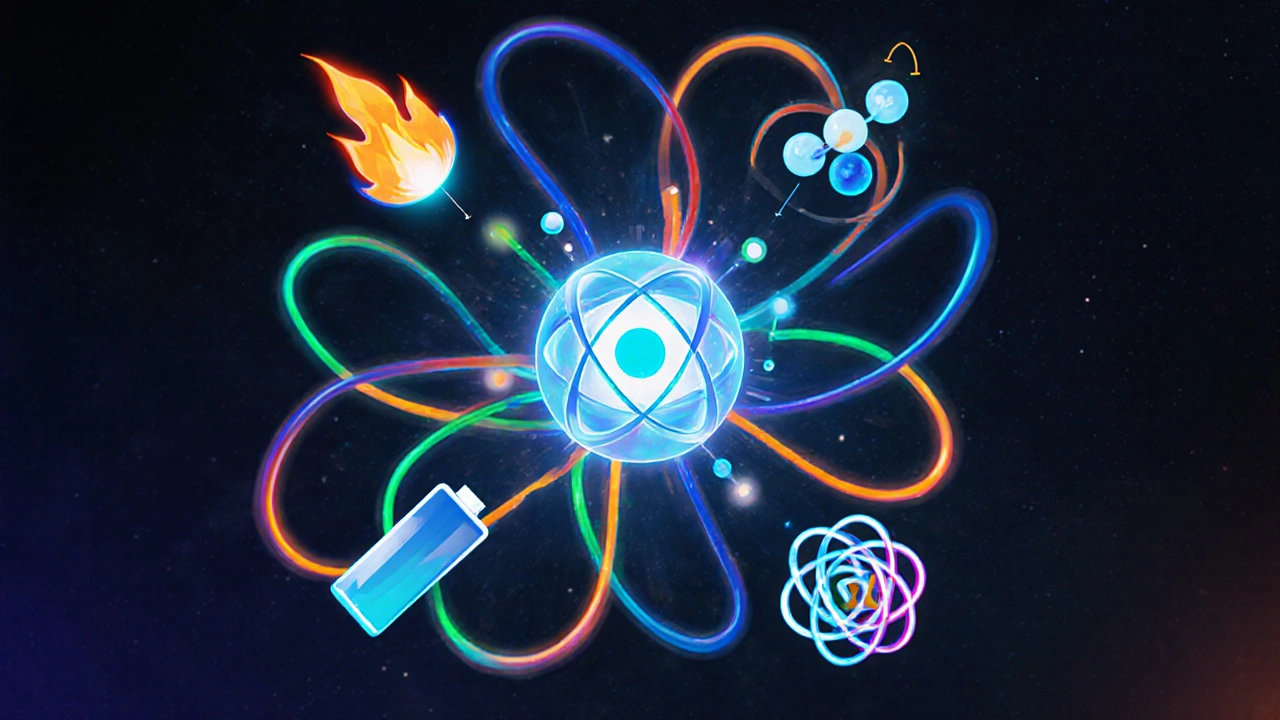JEE Physical Chemistry Strategy Calculator
Calculate your potential score impact when skipping low-yield physical chemistry topics. Based on your organic/inorganic strength and target score, this tool will help you determine if your strategy is viable.
Your Strategy Analysis
Estimated Physical Chemistry Marks (if skipping low-yield topics):
Total Chemistry Score (if you skip low-yield topics):
Your Strategy Risk Assessment:
When you stare at the JEE chemistry syllabus, the first thing that pops up is the massive split between physical, organic, and inorganic sections. Physical Chemistry is the part that deals with thermodynamics, kinetics, electrochemistry, and quantum concepts. It’s also the section many students find intimidating because it feels more like physics than chemistry.
So, can you really skip it and still crack JEE? The short answer is no - you can’t afford to ignore it completely. But you can strategize, prioritize, and allocate your time so that the topics you skip cause minimal damage to your overall score. Below we break down the why, the how, and the realistic trade‑offs.
Quick Takeaways
- Physical Chemistry makes up roughly 30‑35% of the total chemistry marks in JEE Main and Advanced.
- Skipping low‑weight topics (e.g., statistical thermodynamics) can be viable if you master high‑yield ones.
- Integrate physical concepts while solving organic/inorganic problems to retain key ideas.
- Use NCERT Chemistry as the baseline; supplement with target‑oriented coaching notes.
- Regular mock tests will reveal whether your shortcut strategy holds up under real exam pressure.
Why Physical Chemistry Carries Weight
The JEE Main and JEE Advanced both allocate about 12‑16 marks out of 54 to chemistry. Within those 12‑16 marks, physical chemistry contributes 30‑35%, meaning you lose roughly 4-5 marks if you ignore it completely. In a cut‑throat exam where a single mark can sway rank, that loss is significant.
Moreover, many physical concepts reappear in organic reaction‑mechanism questions or inorganic equilibrium problems. A solid grasp of thermodynamics, for instance, helps you quickly evaluate reaction spontaneity in organic synthesis questions.
Identify High‑Yield Topics
Not every physical chemistry topic is created equal. Here’s a quick map of what typically appears most often (based on the last three years of JEE papers):
| Category | High‑Yield Topics | Low‑Yield Topics |
|---|---|---|
| Thermodynamics | Enthalpy, Hess’s Law, Gibbs Free Energy | Statistical Thermodynamics |
| Kinetics | Rate laws, Collision theory, Arrhenius equation | Complex reaction mechanisms |
| Electrochemistry | Galvanic cells, Nernst equation, Faraday’s laws | Electrolytic dissociation constants |
| Quantum Chemistry | Hydrogen atom model, Bohr’s postulates | Advanced spectroscopy |
Focus on the high‑yield items. If you can answer all questions from these sub‑topics confidently, you’ll still capture most of the physical chemistry marks.

How to Trim Down Study Time
- Set a 30‑% time cap. Allocate no more than 30% of your total chemistry study hours to physical chemistry. The remaining 70% goes to organic and inorganic, which together account for a larger share of marks.
- Use concept‑linking. When you study a thermodynamics problem, also note how that principle appears in organic reaction energetics. This double‑dipping reduces separate revision cycles.
- Leverage NCERT first. The NCERT Chemistry book covers all essential equations and derivations. Memorize the formula sheet; you won’t need to re‑derive each concept.
- Adopt targeted coaching notes. Many Coaching Institutes publish concise “high‑yield” PDFs that skip obscure topics. Use them as a quick refresher before mock tests.
- Practice mixed‑topic questions. Instead of solving 20 pure physical chemistry problems in a row, solve a set of 5 physical, 5 organic, and 5 inorganic. This mimics the real paper’s interleaved nature.
Risk Assessment: What You Lose by Skipping
Skipping any segment is a gamble. Here’s the typical fallout if you ignore physical chemistry entirely:
- Mark loss: 4‑5 marks gone automatically.
- Conceptual gaps: You may misinterpret kinetic data in an organic rate‑law question.
- Time pressure: In the real exam, you’ll have to spend extra minutes on a question that feels unfamiliar, cutting into your ability to solve easier organic/inorganic items.
However, if your strengths lie in organic chemistry (e.g., you can solve 90% of organic problems), the net impact might be acceptable. It’s a personal calculus: weigh your current scores in each sub‑section against the loss you’d incur.

Mock Test Strategy: Validate Your Shortcut
Before you lock in a skip‑plan, take at least three full‑length mock exams using the latest IIT JEE Syllabus pattern. Analyze the following:
- How many physics‑style chemistry questions appear?
- What is your accuracy on those when you only studied high‑yield topics?
- Do the missed marks push you below your target rank?
If the mock results show a comfortable buffer (e.g., you still score > 80% of total chemistry marks), you can safely de‑prioritize low‑yield physical sections. If not, adjust your plan - maybe add a few extra hours for those stubborn topics.
Final Checklist Before the Exam
- ✅ Memorized all high‑yield physical chemistry formulas (list ready in notebook).
- ✅ Completed at least 30 mixed‑topic practice sets.
- ✅ Reviewed organic and inorganic chapters thoroughly - they together contribute ~65% of chemistry marks.
- ✅ Took 3 mock exams and confirmed you’re still within your target score range.
- ✅ Prepared a quick reference sheet for physical chemistry equations to glance at during the exam (allowed for JEE Main).
Is it legal to skip physical chemistry in JEE Main?
Yes, there’s no rule that forces you to attempt every question. However, skipping a whole section reduces your maximum possible score.
What weightage does physical chemistry have in JEE Advanced?
Physical chemistry contributes about 30‑35% of chemistry marks, which translates to roughly 4‑5 marks out of the total chemistry section.
Can I rely only on NCERT for physical chemistry?
NCERT covers all core concepts and equations. For JEE, supplement with high‑yield coaching notes to save time on derivations and extra problems.
How many hours per week should I allocate to physical chemistry?
Aim for 30% of your total chemistry study time. If you study chemistry 20 hours weekly, spend about 6 hours on physical chemistry, focusing on high‑yield topics.
What’s the best way to revise physical chemistry quickly before the exam?
Create a one‑page formula sheet with all equations, constants, and key concepts. Do a rapid 2‑hour mock test consisting only of physical chemistry questions to gauge readiness.
